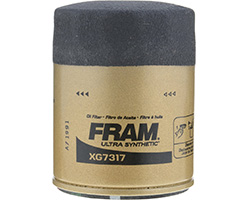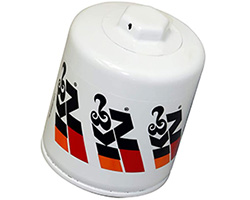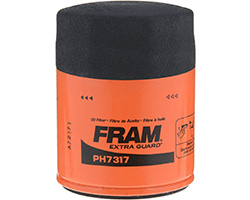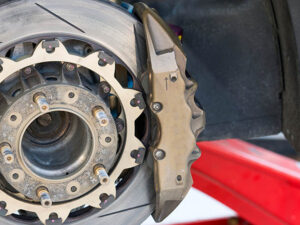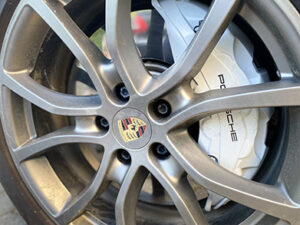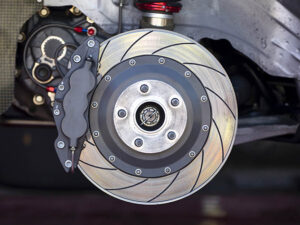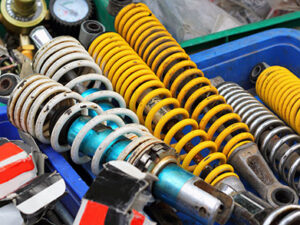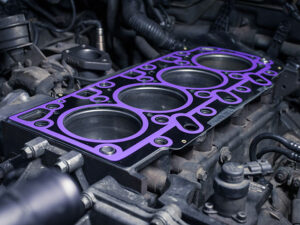Home \ Shop \ Engine & Efficiency \ Oil Filters
The Best Oil Filters for Your Car: Everything You Need to Know
Ensure the safety and maximum performance of your car engine by using the best oil filters
- 1. Review of The Best Oil Filters
- 2. FRAM XG7317 Ultra Synthetic Spin-On Oil Filter
- 3. K&N HP-1003 Performance Wrench-Off Oil Filter
- 4. FRAM PH7317 Extra Guard Spin-On Car Oil Filter
- 5. BOSCH 3330 Premium FILTECH Oil Filter
- 6. Royal Purple 20-500 Extended Life Premium Oil Filter
- 7. Main Types and Options of The Best Oil Filters
- 8. Picking the Right Oil Filter
- 9. When Should I Change My Oil Filter?
Any car owner is familiar with changing their oil. It’s a basic maintenance procedure and keeps your engine running smoothly and efficiently. On the other side of the coin, there’s oil filters – just as important as the oil itself when it comes to keeping your engine healthy.
The best oil filters will keep your car running at peak performance between oil changes, and prevent any debris from getting into your engine. At the end of the day, you want great oil and a great oil filter to go with it; they work in tandem to help maintain your car’s shape. That begs the question: what are the best filters on the market right now, and which one is best suited for me? Let’s take a look at our top five.
Review of The Best Oil Filters
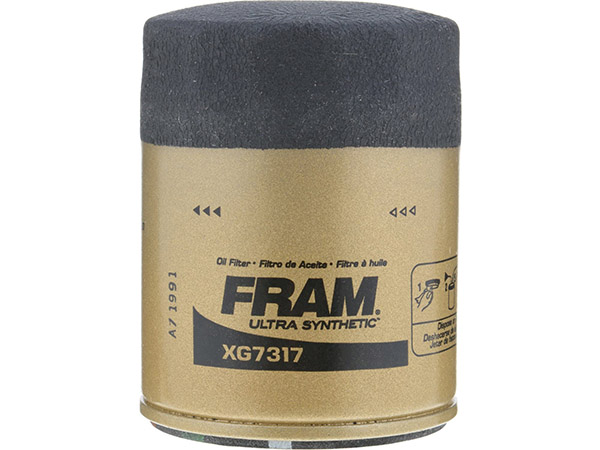
PROS
- High longevity up to 20000 miles
- Affordable
- Maintains top performance
- Maximum engine health
- Easy to spin out by the hands
CONS
- No significant downsides
It might come as a surprise that our top pick isn’t one of the big names like Mobil 1, but the FRAM XG7317 is truly a fantastic choice. Its design maintains the efficiency of your engine and gets the best out of your car and oil.
All-Round Quality: Very Good up to 20,000 miles!
This FRAM filter offers extended protection for up to 20,000 miles; some buyers even went above this mark and their filter still showed clean performance. This model has synthetic media with a silicone anti-drain back, adding to the quality of filtration even with conventional oils. In addition, installation and handling is quite simple due to its easy grip cap. All in all, FRAM has a very deliberate attention to quality for every part, which makes the filter as a whole easily one of the best out there.
While FRAM has a variety of oil filters for different purposes, the XG7317 is designed to provide top performance in newer engines and add much-needed protection for older engines. Unsurprisingly, as the name suggests, it’s recommended to pair this model with synthetic oil, but like we mentioned, some drivers found results with conventional oil as well. To top it all off, FRAM ensures that this filter removes 99% of all debris as little as just 20 microns. All in all, this filter pretty much does everything it’s designed to, and will keep your engine running smoothly and dirt-free for long stretches of time.
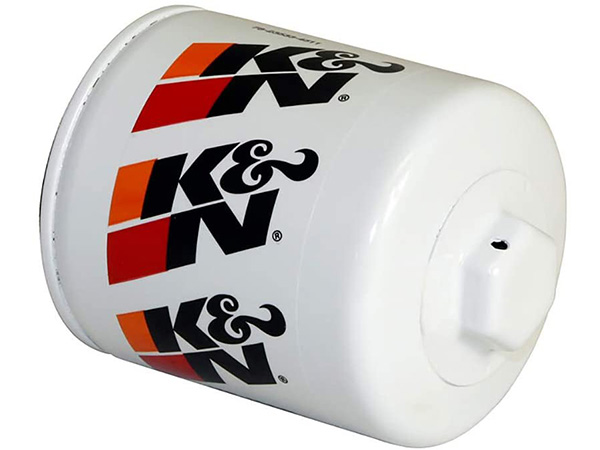
PROS
- High longevity
- Easy to remove (by the wrench)
- Great with any oil
- High flow rate
- Quality filter construction
CONS
- No significant downsides
For something a little more high-end, the K&N HP-1003 is something to consider. Its construction takes a more heavy-duty approach, with special attention given to weather conditions.
Heavy-Duty: Great Longevity along with best performance
This filter is designed to be a near-universal application, marketed as an OEM filter replacement for most cars, trucks, motorcycles, and more. It contains a resin-impregnated cellulose media, which helps trap 99% of debris and contaminants. The filter is fixed via a 1-inch nut, which allows you to secure and remove it even in awkward spots.
It’s suitable to use with both conventional and synthetic oils, adding to its universal nature. Essentially, the K&N is a good place to start if you’re unsure about the kind of oil filter you should be looking for. Regardless of weather, type of oil, and (to some extent) the car you’re driving, this model is sure to be a solid choice due to its heavy-duty construction, filtration capabilities, and overall efficiency.
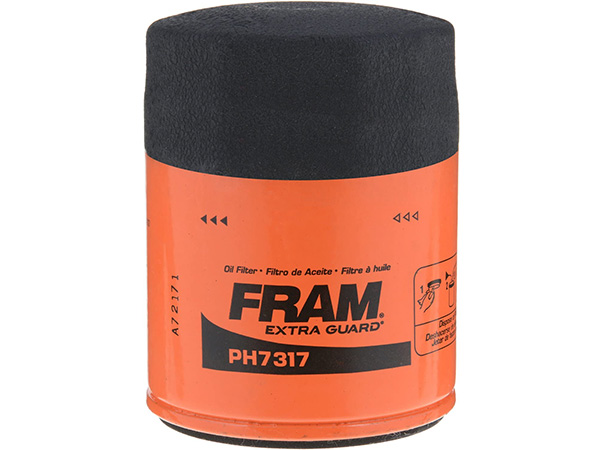
PROS
- Easy to secure/remove
- Quality debris trapping
- Very affordable
- Lines up with oil change intervals
CONS
- Only up to 5,000 miles
FRAM’s XG7317 took our best overall title, and its PH7317 counterpart is coming in as our budget option. You can find it in most places for under $5, which is a steal when you factor in how long it can last you.
Bang for Your Buck: best for whom, who want to change oil frequently
If you’re not concerned with having the absolute best oil filter or don’t drive enough to require a top-of-the-line filtration system, the PH7317 might be for you. FRAM ensures protection for up to 5,000 miles which might seem low at first. However, even with high-end filters, drivers often swap them out after 5,000 miles to be safe. At the end of the day, if the PH7317 offers solid performance along those 5,000 miles, the frequency of changes is about normal. As FRAM themselves state, this filter is for everyday drivers who perform maintenance regularly.
This model is essentially a more watered-down XG7317, which isn’t a slight. It offers up to 95% protection from dirt and debris with its filter media which balances trapping efficiency and capacity. As a whole, FRAM oil filters seem solid across the board, with several options to suit your needs and budget. This model is more affordable, but that’s not to say that it isn’t effective. However, one thing to note is that the Extra Guard is engineered for conventional oil.
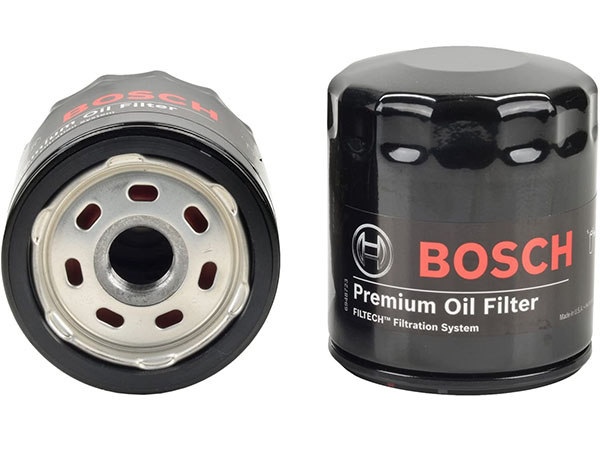
PROS
- Easy to secure/remove
- Very durable construction
- Focus on quality filtration
- Keeps engine healthy and prevents debris/damage
CONS
- Best with not-full synthetic oils
- Generally up to 5,000 miles
Bosch narrowly misses the cut for best overall, but it is definitely deserving of any driver’s consideration. However, there are a few limitations that hold it back from being a universally great option.
We discovered, that this filter if Durable and Effective
The Bosch 3330 has a substantial focus on proper filtration. They boast that the filtering area in the FILTECH is up to 42% larger than conventional filters, with a media up to 30% thicker as well. Interestingly, a decent amount of glass is woven into the synthetic blend media with the aim of higher efficiency in trapping debris particles (reportedly up to 99%). The filter also offers a silicone anti-drainback valve (similar to the K&N model) which ensures that clean oil is used when starting the engine.
Overall, the FILTECH aims for convenience and durability in one slick package. The strong steel plates and casing prevent any warping or inadequate fits, while the gasket design offers a tight seal and easy removal. One thing to note, however, is that Bosch recommends using Castrol motor oil, and in any case, not fully synthetic oils. Because the filter itself isn’t fully synthetic, it’s best to use conventional oil or possibly semi-synthetic.
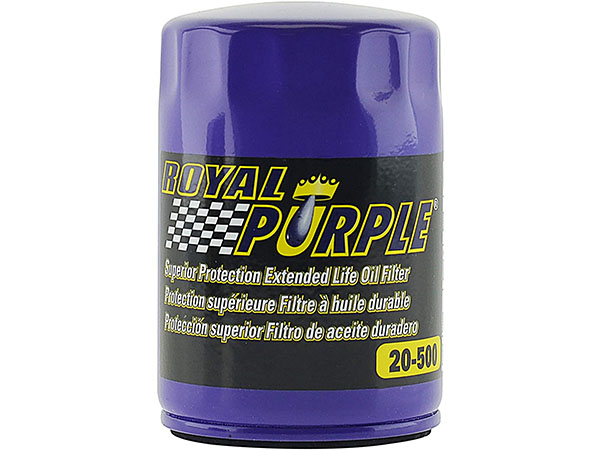
PROS
- Easy to secure/remove
- Durable silicone construction
- Accurate debris filtration
- Up to 15,000 miles
- Great with synthetic oil
CONS
- Occasional rust issues
Our final choice to round out the top five oil filters is a bit of an outsider brand in Royal Purple, known for their state-of-the-art fluids. Their 20-500 Extended Life model is a very good option for anyone unafraid to spend a bit extra on a quality filter.
Bit of Everything: another one premium quality oil filter
With a reputation for their focus on quality, Royal Purple’s premium oil filter is nothing to sneeze at. It is tested to provide protection for up to 15,000 miles when used in conjunction with synthetic oils. In fact, the company even outlines that they cross-referenced their filters with competitors’ models similar to those on our list (namely the K&N and FRAM filters). The filtering media itself is quite appealing: an all-synthetic microglass construction with a 99% filtering efficiency for particles down to 25 microns (if you recall, our top choice goes down to 20 microns). For particles of 10 microns or smaller, it boasts an 80% efficiency.
It also has the built-in dry start prevention found in (for example) the K&N and Bosch 3330 thanks to the anti-drain back valve. The flexible rubber gasket and metal caps offer both a tight seal and leak prevention. One drawback that a few buyers point out, though, is that the inside of their filter either developed rust or had it to begin with. Other than that, this premium long-lasting filter offers great protection and filtering efficiency.
Main Types and Options of The Best Oil Filters
There are many kinds of oil filters, and it’s important to familiarize yourself in this area to get the filter that’s perfect for you. First off, there’s of course the question of fit – some oil filters are designed to be more-or-less universal (such as the K&N model in our list), while others have a more limited selection of vehicles, like the FRAM PH7317. You need to make sure your vehicle is in the range of suitability, and that installation and removal isn’t a hassle.
Categories of Oil Filters
The advancement of pressurized lubrication technology brought about some key components in modern oil filters. For example, filters today incorporate a metal bypass valve, a relief system that allows oil to bypass the filter if it’s clogged. This ensures that the engine has a source of oil regardless of flow restriction.
As for the different types, there are several classes of filters that approach the problem of accumulating debris differently. The simplest and perhaps least modern types of filters are mechanical; they are pretty straightforward in that they typically utilize filter paper and cotton to catch any particulates. As you might’ve guessed, these require more frequent changes due to the relative inefficiency in keeping the oil flow clean and unrestricted over time.
NOTE: Always use those filter type, which has predicted by your car manufacturer. Also your new filter must fit your vehicle. Check this before you buy.
The most common and preferred types of filters nowadays have a spin-on design that makes filter changes simpler. Initially, the filter housing was a permanent attachment that contained a replaceable cartridge inside. However, starting in the 1950s, there was a vast shift in favor of filters with a filter and its housing as one replaceable unit. From the 1990s, through, a preference favor of cartridge designs grew once again. All in all, though, efficiency in production and filtration makes spin-on filters more convenient to replace and maintain, which is reflected in our choices.
Other more niche filter types include sedimentary, magnetic, and centrifugal. Sedimentation (or gravity bed) filters allow the debris to sit on the bottom of the housing, as most particles are heavier than the oil itself. Magnetic filters are designed to attract and capture metallic particles, and while there is a debate regarding their effectiveness, cleaning them involves simply brushing the particles off the magnet. Centrifugal filters are similar to sedimentation filters, but rather than using gravity, utilize centrifugal force (the outward force caused by spinning) to separate debris from the oil.
Generally speaking, spin-on filters are the easiest to use and replace among their counterparts, as it simply requires you to screw off the old and screw on the new. Cartridge filters are similar in that regard, but could get a little messy as you have to remove the filter itself from its housing.
Media Type
As discussed briefly above, synthetic and semi-synthetic media are more efficient at trapping debris and keeping your engine running smoothly. The filtration media itself developed vastly since the basic paper filter and cotton designs of the past. A synthetic media is generally more effective at filtering contaminants and can lead to a higher lifetime of both the filter and your engine. Synthetic materials used can include glass, nylon, and polyester, due to the more density of fibers compared to other materials. They also are more efficient at trapping much smaller debris as a result.
Semi-synthetic, or a blend, offers lower cost and comparable performance. Cellulose is also commonly used, and while it isn’t as effective as synthetic or blend, it’s more affordable. An example of such media can be found in the K&N on our list.
Some are even branded “High Efficiency” filters, which means it is generally more effective for oil flow and reduces wear on the engine. This design can also vastly increase a filter’s drain interval.
Capacity
The capacity of the filter is fairly straightforward, and depends on the size of the filter and the type of media. Simply put, if you have a filter with a more inefficient media, you’ll reach capacity and need to replace it sooner than one with synthetic media, for example. Filters with higher capacity, like the FRAM XG7317, typically have a very efficient filtration system. The sooner a filter reaches its capacity for debris, the sooner your engine will default to receiving oil via the bypass valve.
Picking the Right Oil Filter
Generally speaking, there are a few qualities you want in your oil filter. Firstly, and perhaps most importantly, make sure that the filter will fit in your car. Cross-reference the product description with your vehicle manual to be absolutely certain that it’s compatible.
Related post: Best Synthetic Motor Oils
Next, you’ll want to get the best filter media possible. This doesn’t necessarily mean you need to get a synthetic or semi-synthetic filter – you just need something that’s proven to be effective and synergistic with the type of oil you prefer to use. If you have a new car and drive frequently, you’d want to look for a filter that limits damage to your engine and offers top performance across a sizable mileage. On the other hand, if you have an older model, you’d want to look for a filter that is proven to maintain your engine’s quality of life.
As with many car parts and accessories, a lot of it is ultimately down to your preferences and vehicle. Try looking for filters that are not only effective, but suitable to your driving frequency and engine quality in terms of filtration media and filter change requirements.
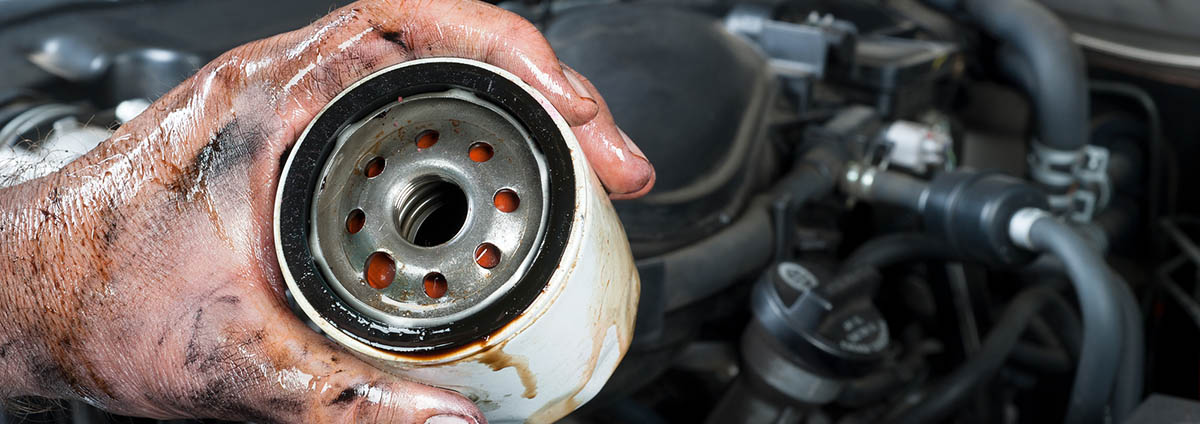
When Should I Change My Oil Filter?
This is one of the more common questions surrounding oil filters and maintenance, and is different for every type of filter. As a rule of thumb, many drivers follow the “5000 miles” rule, meaning they change their filter once they accrue 5000 miles with it. However, your first instinct should be to check the recommendations outlined by the filter manufacturer.
Related posts: Best Engine Air Filters and 5 Best Cabin Air Filters for Car
Another rule of thumb regarding oil and filter changes is based on oil change recommendations. Typically, you want to change your oil either once every three months or every 3,000 miles. Based on this, a frequent suggestion regarding your oil filter is to change it every other time you perform an oil change – essentially, at most every 6,000 miles or 6 months, depending on your driving patterns.
Your best bet is to follow one of these rules once or twice with a chosen filter and check the results. Some drivers often cut into their filter once they’ve replaced it to assess the thickness and color of the oil. If your filter manufacturer suggests that you can go 20,000 miles before replacing it, you could remove it at 10,000 (for example) and check if it was still working smoothly. Once you’ve tested a filter’s capabilities with your oil and engine a few times, you should get a good idea for the frequency of changes.
- How an oil filter works? – Mobil.com
- Anatomy of an Oil Filter – Machinery Lubrication
We do an efforts to find, research and recommend the best products. So, we may receive commissions from purchases that you make after following the links in our product reviews.


